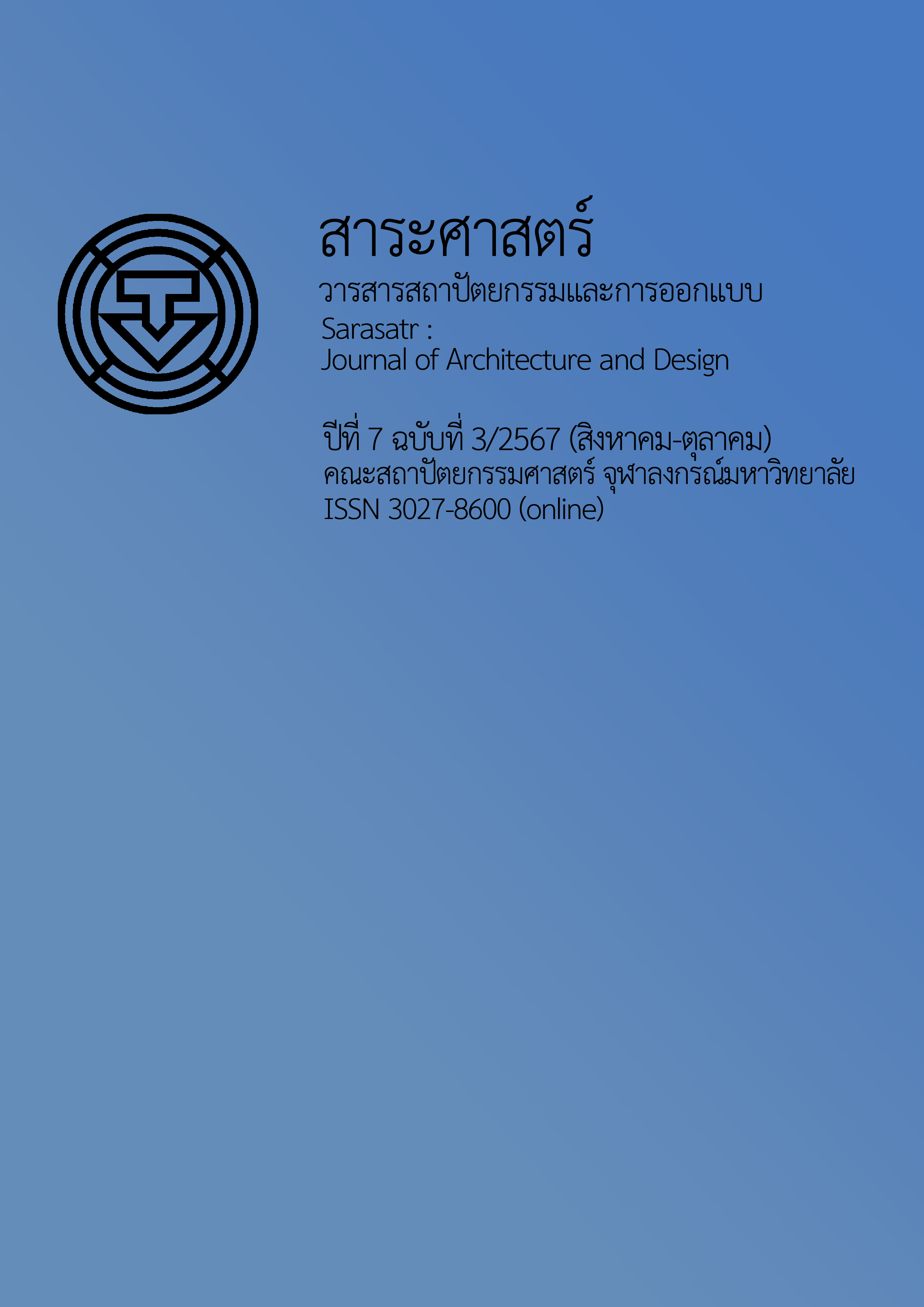ทัศนคติด้านสุขภาวะในการอยู่อาศัยของผู้อยู่อาศัยในอาคารชุด ระดับราคา 2-3 ล้านบาท ในเขตกรุงเทพมหานครและปริมณฑล
Main Article Content
บทคัดย่อ
แนวคิดเรื่องสุขภาวะที่ดี (well-being living) ได้รับความสนใจอย่างมากโดยเฉพาะในภาคธุรกิจอสังหาริมทรัพย์ประเภทที่อยู่อาศัยในแนวสูง ในขณะเดียวกันอาคารชุดหลายแห่งในปัจจุบันมีขนาดพื้นที่ห้องชุดที่เล็กลงกว่าในอดีต ซึ่งอาจส่งผลต่อสุขภาวะในการอยู่อาศัยได้ งานวิจัยนี้มุ่งศึกษาทัศนคติด้านสุขภาวะของผู้อยู่อาศัย และวิเคราะห์ลักษณะทางกายภาพขององค์ประกอบของอาคารชุดที่ส่งผลต่อสุขภาวะในการอยู่อาศัยในอาคารชุดระดับราคา 2-3 ล้านบาทในพื้นที่กรุงเทพมหานครและปริมณฑล รวบรวมข้อมูลด้วยแบบสอบถามจากกลุ่มตัวอย่างผู้อยู่อาศัยจำนวน 470 คน และวิเคราะห์ข้อมูลด้วยสถิติเชิงพรรณนา (descriptive statistics)
ผลการศึกษาพบว่า 1) ผู้ตอบแบบสอบถามมีระดับสุขภาวะในการอยู่อาศัยระดับปานกลางถึงมาก โดยผู้ตอบแบบสอบถามส่วนใหญ่เป็นเพศหญิง (ร้อยละ 70) มีอายุอยู่ในช่วง 25-39 ปี (ร้อยละ 62.98) สถานภาพโสด (ร้อยละ 84.89) รายได้ต่อเดือนเฉลี่ย 10,001-20,000 บาท (ร้อยละ 25.74) สถานภาพการเป็นเจ้าของห้องชุดผู้ซื้อมีสัดส่วนมากที่สุด (ร้อยละ 49.15) อาศัยอยู่คนเดียว (ร้อยละ 40.85) และใช้เวลาในอาคารชุด 6-12 ชั่วโมงต่อวัน (ร้อยละ 38.30) 2) องค์ประกอบของอาคารชุดที่สำคัญและส่งผลต่อสุขภาวะมากที่สุด คือคุณสมบัติของห้องชุด ซึ่งเป็นปัจจัยภายในห้องชุดที่เกี่ยวข้องกับคุณภาพอากาศ อุณหภูมิที่ไม่ร้อนไม่เย็นจนเกินไป และการป้องกันเสียงรบกวน ซึ่งผู้อยู่อาศัยให้ความสำคัญและยังไม่เป็นไปตามที่คาดหวัง หากได้รับการปรับปรุงจะสามารถเพิ่มระดับสุขภาวะในการอยู่อาศัยได้มากยิ่งขึ้น 3) ลักษณะอาคารชุดที่ส่งผลต่อสุขภาวะในการอยู่อาศัย ประกอบด้วย ระยะห่างจากสถานีรถไฟฟ้า ประเภทโครงการ อายุอาคารชุด ขนาดพื้นที่ห้องชุด 4) ผู้ที่มีสุขภาวะในการอยู่อาศัยระดับมาก มักอาศัยอยู่ในโครงการที่มีลักษณะดังต่อไปนี้ อาคารชุดประเภทความสูงไม่เกิน 23 เมตร ห่างจากสถานีรถไฟฟ้าในระยะไม่เกิน 500 เมตร ที่มีอายุอาคารน้อยกว่า 5 ปี และห้องชุดมีขนาดพื้นที่ 30-34 ตร.ม.
จากผลการศึกษาชี้ให้เห็นว่า ถึงแม้ว่าอาคารชุดไม่ได้เข้าร่วมตามเกณฑ์ประเมินมาตรฐานอาคารเพื่อสุขภาวะระดับสากล แต่ผู้อยู่อาศัยมีสุขภาวะในการอยู่อาศัยระดับปานกลางถึงมาก โดยมีปัจจัยด้านภายในห้องชุดมีความสำคัญและส่งผลต่อระดับสุขภาวะมากที่สุด ผลการศึกษานี้จะเป็นประโยชน์ต่อผู้ประกอบการ รวมถึงหน่วยงานภาครัฐที่เกี่ยวข้องกับการพัฒนาที่อยู่อาศัยประเภทอาคารชุดให้มีลักษณะที่ส่งเสริมสุขภาวะในการอยู่อาศัยที่ดีมากยิ่งขึ้น
Article Details
เอกสารอ้างอิง
กัลยา วานิชย์บัญชา. (2549). สถิติสำหรับงานวิจัย (พิมพ์ครั้งที่ 2). โรงพิมพ์แห่งจุฬาลงกรณ์มหาวิทยาลัย.
การเคหะแห่งชาติ. ฝ่ายวิจัยและการก่อสร้าง. (2525). มาตรฐานที่อยู่อาศัยประเภทอาคารชุด. กคช.
ชุติมา ศรีอรุณ. (2562). แนวทางการเสริมสร้างสุขภาวะเชิงสถาปัตยกรรมของผู้อยู่อาศัยในอาคารชุด ในกรุงเทพมหานคร กรณีศึกษา โครงการเดอะรูมสุขุมวิท69 และเดอะรูมสาทร-ถนนปั้น [วิทยานิพนธ์ปริญญามหาบัณฑิต ไม่ได้ตีพิมพ์]. จุฬาลงกรณ์มหาวิทยาลัย.
ณิชารัตน์ อัครมณี. (2561). โอกาสและข้อจำกัดของการพัฒนาโครงการคอนโดมิเนียมโดยใช้แนวคิดสุขภาวะของผู้ประกอบการในกรุงเทพมหานคร [วิทยานิพนธ์ปริญญามหาบัณฑิต ไม่ได้ตีพิมพ์]. จุฬาลงกรณ์มหาวิทยาลัย.
ดวงกมล ศักดิ์เลิศสกุล. (2549). แผนธุรกิจของสถานบริการสุขภาพแบบองค์รวม. มหาวิทยาลัยขอนแก่น.
Nexus Property. (2561). แนะการพัฒนาโครงการคอนโดฯ ในกรุงเทพฯ ให้เติบโตอย่างยั่งยืน. https://nexus.co.th/news
เมธาวี อื้ออารีย์กุล. (2562). องค์ประกอบทางกายภาพของห้องชุดพักอาศัยแบบ 1 ห้องนอนที่ส่งผลต่อสุขภาวะทางใจของผู้อยู่อาศัย : กรณีศึกษาโครงการอาคารชุด บริษัท แอล.พี.เอ็น.ดีเวลลอปเมนท์ จำกัด (มหาชน) [วิทยานิพนธ์ปริญญามหาบัณฑิต ไม่ได้ตีพิมพ์]. จุฬาลงกรณ์มหาวิทยาลัย.
วริสรา ไพจิตรพิทักษ์. (2563). แนวทางการพัฒนาโครงการบ้านเดี่ยวภายใต้แนวคิดสุขภาพ กรณีศึกษาโครงการจีรัง เรสซิเดนซ์ และโครงการณุศาชีวานี พัทยา [วิทยานิพนธ์ปริญญามหาบัณฑิต ไม่ได้ตีพิมพ์]. จุฬาลงกรณ์มหาวิทยาลัย.
สุธาสินี บุญน้อม. (2563). แนวทางการพัฒนาอาคารชุดเพื่อสุขภาพดี กรณีศึกษาโครงการจิณณ์เวลบีอิ้ง เคาน์ตี้ จังหวัดปทุมธานี และโครงการไนท์บริดจ์ ดิ โอเชี่ยน ศรีราชา จังหวัดชลบุรี [วิทยานิพนธ์ปริญญามหาบัณฑิต ไม่ได้ตีพิมพ์].จุฬาลงกรณ์มหาวิทยาลัย.
เสริชย์ โชติพานิช, วัลยา พัฒนพีระเดช, สิทธิพร อิสระศักดิ์, และมนรดา ภาณุสิทธิกร. (2559). การจัดการนิติบุคคลอาคารชุดพักอาศัย. โรงพิมพ์แห่งจุฬาลงกรณ์มหาวิทยาลัย.
International WELL Building Institute [IWBI]. (n.d.). Well building standard v2. https://v2.wellcertified.com/en


